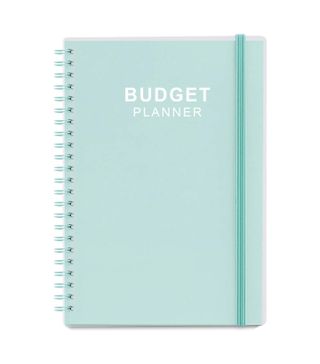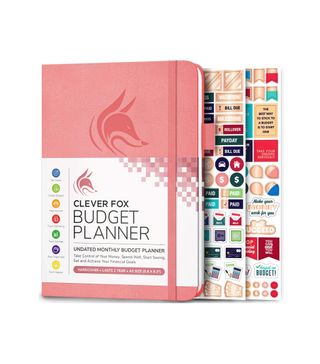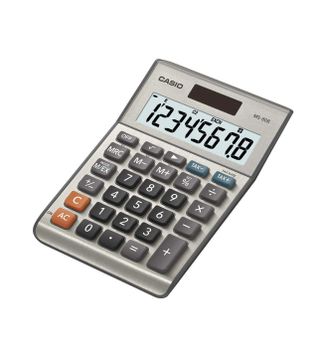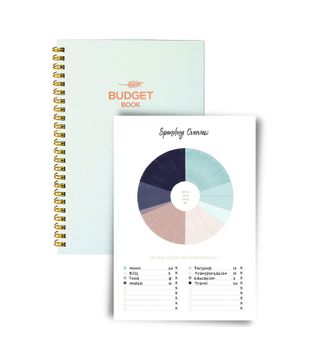9 Habits to Take Up If You Want to Have More Money

Just about anyone can benefit from creating good financial habits for themselves, right? I know I always think to myself, I should probably get better with my money, whenever I look at my bank account after a weekend or week when I've gone over budget or have forgotten my budget entirely. And I don't think I'm the only one who has this thought often. According to an Ellevest Financial Wellness Survey, 45% of women said the pandemic inspired them to make or consider making new financial goals.
It can be overwhelming, though, to think about where to start. And it's all based on your personal situation, too. But it made me feel better to hear that it's okay to start slowly and that it's an evolving process. "It can be overwhelming to pick up these big, life-changing habits all at once and think we can master them for the rest of our lives," says Sofia Figueroa, a certified financial planner at Ellevest. "Oftentimes, if we approach lifestyle changes this way, we can set ourselves up to fail pretty quickly. Financial wellness isn't a destination we arrive at suddenly—it's an ongoing, mindful practice."
And it doesn't end with habits and a budget. Figueroa explains that it's about creating a healthy relationship with money. "We know that money is women's number-one source of stress, but taking action with money is women's number-one driver of confidence in achieving their goals," she says. "That's why financial wellness doesn't begin and end with building good habits and creating a road map to achieve your goals. It also involves cultivating a healthy relationship with money that helps you stay motivated and engaged."

When it comes to finances and budget, think about bringing your lifestyle choices and habits back to your core values, Figueroa says. When you're spending, saving, and making decisions that match what matters to you, you'll feel a greater sense of contentment and confidence in your financial well-being. To understand your core values, she recommends making a list of three to five values that matter the most to you (like security, adventure, health, etc.). Keep them in mind as you build a budget, set goals, and make everyday decisions.
And it can be helpful to start with setting intentions. "Intentions are more flexible—they say yes to progress and no to putting unnecessary pressure on ourselves," Figueroa says. "We will all face roadblocks or make mistakes—we're human! When that inevitably happens, rather than beating yourself up over it, give yourself some grace and remember how far you've come."
If you're just starting to figure all of this out, financial advocate and chief people officer at Credit Karma, Colleen McCreary, recommends taking stock of your finances first. "Look at any income you have coming in, and project out any expenses over the coming months," she suggests. "You could even do an audit of the last few months to see where you're spending the most. See if you can spot trends in unnecessary spending that add up on a monthly basis and that you may have never noticed."
Figueroa also suggests categorizing all of these expenses and transactions into three buckets: needs, fun, and "future you" (saving, investing, debt payments beyond your minimums). This can help you understand where you might be overspending or where you might have more wiggle room with your budget.
And it helps to understand your own money mindset. Figueroa recommends asking yourself these check-in questions: When you were a kid, how did the adults in your life—specifically, your parent(s) or guardian(s)—do money? How did your family's approach to money affect how you did money when you became an adult? Did you follow those same habits or swing way in the opposite direction? When you spend, what are your main triggers? Stress? FOMO? An unstoppable urge to feel a thrill at 2 a.m. on Etsy? If you've tried and failed to stick to a money plan in the past, what were the factors—logical or otherwise—that made you throw in the towel?

As you're getting your finances in order, you'll want to be careful, though, about overdoing it or trying to do too much all at once. "Some mistakes people can make when creating good habits are trying to build too many habits at once, starting big and losing motivation, not being consistent, and not being patient with seeing results," says WalletHub analyst Jill Gonzalez. "It's important to take up good habits or adjust your habits with a clear goal in mind. Make sure your goal is achievable, and break it into smaller ones if necessary. This can help you stay motivated. Lastly, be aware that changing your habits takes time. Don't expect to see results overnight, and don't get discouraged and give up after a failure."
And don't forget to congratulate or reward yourself when you do a good job and reach one of your goals. "It may motivate you to continue working toward your goals if you know there's something fun waiting for you once you get there," McCreary says. "You don't have to go overboard with the reward—it can be treating yourself to your favorite dinner or buying something small for your apartment. There are even fun things to do or give that are free. Just make sure you budget for these rewards when you set your budget."
Now, if you're looking for some ideas for good money habits to take up, the experts shared some recommendations below.
Money Habits to Consider
1. Establish a Budget
First things first, it helps to start with a budget. "A strong habit to set and maintain is to establish a budget and be deliberate with your spending," McCreary says. "A budget can be daunting, so think of it more as a plan for your money. Without a budget, you risk overspending on unnecessary things that you can't afford and under-saving for big-ticket purchases and unexpected events."
Figueroa adds that you should find a strategy that fits your day-to-day routine—your budget shouldn't feel punishing.
2. Regularly Check Your Balances

"Your checking account can be hard to look at, especially if you're new to your financial wellness practice," Figueroa says. "But you know what's even harder to look at? Overdraft fees. Add checking your bank balance to your weekly routine, and eventually, it'll become less daunting. Even if you know you have enough to pay your bills, checking in regularly can help you review that week's spending and reset your money mindset for the week ahead."
3. Pay Yourself First

No, this doesn't mean paying yourself to go shopping or have other treat-yourself moments. It means saving for the future. Figueroa says this habit is so important to build over time and incorporate into your financial wellness practice because it will help set you up for financial freedom and success in the long run. "The idea here is to allocate your money toward your financial goals before purchasing anything else. That way, you know you're working your way toward those goals, and you won't spend it on other things! I also recommend setting these goals on auto-pay. The less you have to do, the easier it is to stick with it. Make sure when you're budgeting to carve out some space for 'Future You.' I promise you will thank yourself for it one day!"
4. Create an Emergency Fund

"Another important habit is to build an emergency fund," McCreary says. "An emergency fund is money you set aside to cover any surprises that life may throw your way—things like unexpected medical expenses, home or car repairs, or a job loss. Without an emergency fund, such events could cause you to go into debt."
5. Pay Off Credit Card Debt

This can be tough, but it's so important. McCreary recommends prioritizing your debt payments because letting debt accumulate can set you back for years to come in the form of higher interest payments and lower credit scores. "The long-term benefits of having good credit and not carrying credit card debt should be motivating enough," Gonzalez says. "These benefits translate into money saved on insurance or interest payments on any future loans."
6. Track Your Progress

"This one you can customize. Create a spreadsheet, do a bullet journal spread, use a digital platform—even a sticky note on your computer monitor would work," Figueroa says. "Wherever you do it, keep track of your progress toward a saving or investing goal, be it a vacation in a few months or a down payment on a home. You're building something big, and you deserve to watch yourself get there. For shorter-term goals, check in monthly. For long-term stuff (like retirement), every six months (or as often as you need to feel comfortable) should suffice. And for those investing goals, remember: The market fluctuates, but your plan doesn't have to."
7. Buy the Things You Love

Being "good" with money doesn't mean you have to deprive yourself of things you love or like to do. "Some experts will have you believe that the little things—your morning coffee, your weekly flowers, the more expensive toilet paper, the happy-hour cocktail—are getting in the way of your long-term money success," Figueroa says. "But at Ellevest, we have a little motto we like to repeat: 'Just buy the f***ing latte.' These small expenses aren't getting in the way of your imminent millionaire status—trust us. Those little purchases make life that much more enjoyable. And with all the work you've been doing on your financial wellness—even if you only pick up one of these money habits this year—you deserve a treat for it." So don't be afraid to treat yourself to that pair of new shoes, candle, home-décor piece, or beauty buy, as long as it's within your budget and means.
8. Talk About Money

It can be awkward to bring up the topic of money with others, but it can be so important and helpful. "Talking about money with our friends, family, and peers is one of the best things we can do for ourselves and each other," Figueroa explains. "It reveals pay gaps at work, strengthens romantic relationships, helps you set boundaries around your own financial goals, and more. For those of us who didn't grow up having these money convos, this may sound way too cringey at first. If that's you, I recommend starting with someone you deeply trust and keeping the topics positive, like your fun, long-term money goals. (Hello, month-long trip to Europe.) From there, you can build into more serious topics. Each time you have a money convo, you'll get a little more comfortable, and eventually, you'll work your way to bringing these things up with whomever you'd like!"
9. Review Your Goals and Habits

And don't forget to regularly revisit your goals and habits. They don't have to be 100% set in stone. "Reviewing your habits every month should help you figure out what you're doing right, what you need to change, and keep you on track with improving your financial well-being," Gonzalez says. Figueroa recommends taking some time to review your goals and spending plan any time you go through a life change. That could mean things like starting a new job, adding someone to your family, or moving to a new city.
How can you tell if a habit is working for you? There are some signs. "If thinking through your financial situation causes stress or anxiety, you cringe every time you have to look at your statements, or you hold a grudge against yourself any time you slip up financially, these could be signs that your financial habits aren't working for you," Figueroa says.
Another sign that a spending habit isn't working for you, McCreary adds, is if you find you aren't making good progress with your finances. For example, if you aren't paying off your debts or are spending more than you have, that might be a sign to rethink your strategy.
Next, 15 Smart Budgeting Tips Finance Experts Want You to Know
Disclaimer
This article is provided for informational purposes only and is not intended to be used in the place of advice of your physician or other medical professionals. You should always consult with your doctor or healthcare provider first with any health-related questions.
Sarah is lifestyle writer and editor with over 10 years of experience covering health and wellness, interior design, food, beauty, and tech. Born and raised in Los Angeles, she attended New York University and lived in New York for 12 years before returning to L.A. in 2019.
In addition to her work on THE/THIRTY and Who What Wear, she held editor roles at Apartment Therapy, Real Simple, House Beautiful, Elle Decor, and The Bump (sister site of The Knot).
She has a passion for health and wellness, but she especially loves writing about mental health. Her self-care routine consists of five things: a good workout, “me” time on the regular, an intriguing book/podcast/playlist to unwind after a long day, naps, and decorating her home.










